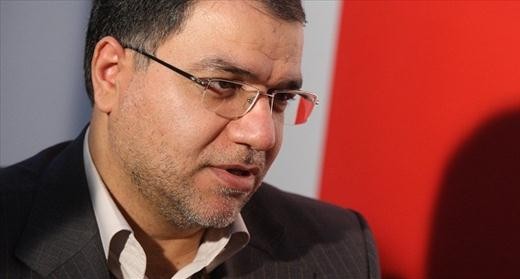Some comments by the president, including his remarks in a conference on the Iranian economy [on Sunday], evoke memories of those who created red herrings for any speech; the outsiders would take advantage of such marginal issues which would also ruin opportunities, wrote Mehdi Fazaeli, a former managing director of Fars News Agency (FNA) in an opinion piece in Jamejam daily. The following is the translation of the piece as reported by Fars News Agency on January 6:
The president’s recent remarks can be a topic for discussion, but the time is tight for addressing all issues surrounding it. In one part of his remarks which was on foreign policy and [nuclear] talks, the president said, “Threats, opportunities and common interests are the base of foreign policy, and principles and ideals are not up for discussion in foreign policy.”
The president further reiterated, “All talks intend to build a bridge between what the other party seeks and what we require. Our ideal is not tied to centrifuges; rather, it is tied to our heart and willpower.”
Apart from false reasoning, there is one clear point in his remarks: “Principles and ideals are not up for discussion in foreign policy.”
In the same conference, Mr. Rouhani pointed to the role and responsibility of the president in implementing the Constitution and somehow expressed regret for non-implementation of “referendum”! Let’s not deny the fact that referendum is a license, not a must, for certain questions, and the difference between the two is clear for experts.
The Constitution’s Article 59 reads, “In considering vital economic, political, social, and cultural issues, it is possible that the legislative power be exercised through referendum or reference to direct public vote. The request to appeal to public votes must be approved by two-thirds of the entire representatives of the Islamic Consultative Assembly.”
Careful attention should be devoted to the phrase “it is possible”, not ‘it is a must’! Moreover, the process to ratify a referendum has been clarified. But in the foreign policy which has been given a separate chapter (Chapter Ten) in the Constitution due to its importance, it is not a matter of “it is possible”, “it can be” and the like; rather, the phrases are completely clear and imperative in order to remove any ambiguity and [possible] ifs and buts.
Read over three, out of four, articles on foreign policy. (The fourth article is on asylum seeking and is irrelevant here).
Article 152 reads, “The foreign policy of the Islamic Republic of Iran is based on the rejection of any kind of domination, both its exercise and submission to it; the preservation of the all-inclusive independence of the country and its territorial integrity; the defense of the rights of all Muslims; non-alignment in relation to the domineering powers; mutual peaceful relations with nonaggressive states.”
We read in Article 153, “Any form of agreement that would result in foreign domination over the natural and economic resources, foreign domination over culture, the army, and other affairs of the country, is forbidden.”
And finally Article 154, which has pointed to the “ideal” – in the foreign policy chapter – says, “The Islamic Republic of Iran considers human happiness throughout human society as its ideal. It considers independence, freedom, and the governance of justice and truth as the right of all the people of the world. Consequently, while it completely abstains from any kind of intervention in the internal affairs of other nations, it supports the struggles of the oppressed for their rights against the oppressors anywhere in the world.”
Now we want to put this question to the president: What do you think about ‘the rejection of any kind of domination, both its exercise and submission to it; the preservation of the all-inclusive independence of the country, non-alignment in relation to the domineering powers, and prevention of any form of agreement that would result in foreign domination, etc.’? Are they interests or ideals? We think they are ideals and believe that the interests of the Islamic Republic have been intertwined with these ideals, with the benefit of the hindsight.
Should attention to these issues be just in our mind and heart, or we should be careful about them at the negotiating table? When talks possibly result in submission to domination or [foreign] domination over the natural and economic resources, culture, the army, and other affairs of the country, is it possible to claim that the country’s interests have been maintained?
“Sometimes” in foreign policy we face “conditions” in which the smallest retreat, even when it is as small as [decommissioning] one single centrifuge, can be a perfect example of submission to domination, and at other times the shutdown of the entire enrichment [program] has no similar meaning. Whether “sometimes” applies to our status today or how the conditions are is a separate, overarching issue which I am not to get into here.
Today we take pride in the fact that not one single meter of the Islamic Republic of Iran’s soil remained under the enemy’s occupation during the Sacred Defense, and hundreds of soldiers fell to prevent such a thing from happening. Drawing on such logic, isn’t it possible not to sustain human losses and allow some areas remain under the enemy’s occupation and say that the country’s territorial integrity is not compromised with one border city?
The president has sworn to God Almighty before the Iranian nation to safeguard the Constitution, an oath he is obliged to make good on, an oath which comes with legal and religious duties once the president takes it.
Mr. Rouhani, you need to be watchful of your advisors!
